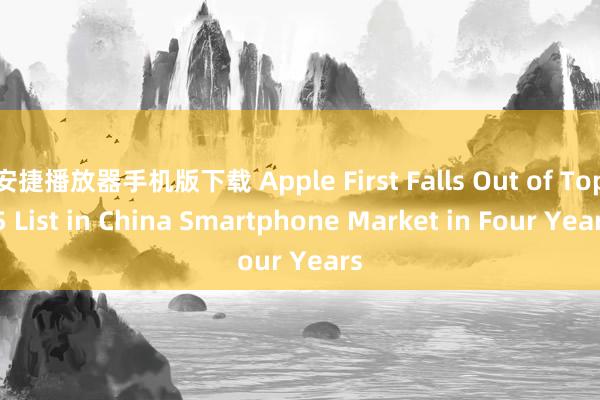韩国撸全色网
安捷播放器手机版下载 Apple First Falls Out of Top 5 List in China Smartphone Market in Four Years

TMTPost -- Latest data showcase Apple Inc. is losing the market share in China as domestic brands accelerated their expansion.安捷播放器手机版下载
Credit:IDC
For the first time in four years, Apple was pushed out of the top five smartphone shippers, according to data for the second quarter of the year from the International Data Corporation (IDC). The global market intelligence firm estimated the overall smartphone shipments in China that quarter grew 8.9% year-over-year (YoY) to 71.6 million units, driven by the Chinese original equipment manufacturers (OEMs), particularly Huawei, vivo and Xiaomi. As the biggest contributors to the increased momentum in the second quater, these three companies each delivered large double-digit growth of shipments. Apple thus was ranked the 6thas local players once again to dominate the top 5 position.
高中性爱Vivo took the top spot with a market share of 18.5%, representing a 17.1% increase in the share. Vivo achieved a significant ascent from the fifth place in the past quarter, mainly fueled by the new products that were well-received from low- to mid-range segment, said Arthur Guo, senior research analyst in Client System Research for IDC China. As the vendor second to vivo, Huawei notch a 18.1% share with a 50.2% YoY increase outshining rivals. In the first half of the year, Huawei was the leader in the market despite the U.S. trade restrictions, further closing the gap with Apple in the price segment above US$600, Guo noted. Xiaomi’s share increased 16.5% YoY to 14.0%, taking the fifth place. Shares of OPPO and Honor dropped to 15.7% and 14.5%, respectively,欧美做爱 with a YoY decline of 2.8% and a decline of 3.7%.
Data from Canalys, a global market research firm, also showed Apple fell out of the top 5 shipment list in China. The mainland China’s smartphone market withnessed a 10% YoY growth in the second quarter, with shipments topping 70 millions. Apple ranked sixth with a market share of 14%, a decrease of 2% from the second quarter last year. Vivo reclaimed the No. 1 spot by shipping 13.1 million units, capturing a 19% market share. This growth, a 15% increase over the previous year, was driven by strong performance in offline channels and robust online sales during the 618 e-commerce festival. OPPO held onto second place, shipping 11.3 million units, buoyed by the launch of its new Reno 12 series. HonOR was third, with shipments of 10.7 million units, marking a 4% year-on-year increase. Huawei followed closely, taking fourth place with shipments of 10.6 million units, though its growth has slowed slightly. Xiaomi saw a 17% YoY increase and re-entered the top five by shipping 10 million units.
"It is the first quarter in history that domestic vendors dominate all the top five positions," added Canalys Research Analyst Lucas Zhong. "Chinese vendors' strategies for high-end products and their deep collaboration with local supply chains are starting to pay off in hardware and software features. Honor's latest Magic V3, which leverages GenAI, has significantly enhanced the user experience of foldable devices. Conversely, Apple is facing a bottleneck in mainland China. The vendor's current channel strategy maintains a healthy inventory level and aims to stabilize retail prices and protect margins of channel partners. In the long term, the Chinese high-end market is ripe with opportunity. Local brands such as Huawei, Honor, OPPO, and vivo are leading the way by incorporating technologies such as GenAI into products and services. Additionally, the localization of Apple’s Intelligence services in mainland China will be crucial in the next 12 months."
While the growth in the second quarter signals a gradual market normalization, Canalys still expected a modest single-digit recovery for the year. Canalys Senior Analyst Toby Zhu listed three key trends that are set to impact the market landscape in the second half of the year. The first is Huawei's upcoming launch of HarmonyOS Next, as the vendor aims to position it as a third major mobile OS alongside Android and iOS. The second, local players are investing in artificial intelligence (AI) infrastructure, developing in-house models, and creating AI applications as key competitive advantages to disrupt the high-end segment. Lastly, the intense domestic competition is also driving overseas expansion, with Chinese brands expected to achieve new milestones in international markets throughout the rest of the year.
开头:https://www.top168.com/news/202407/22891.html安捷播放器手机版下载
marketwithAppleandunits发布于:北京市声明:该文不雅点仅代表作家本东说念主,搜狐号系信息发布平台,搜狐仅提供信息存储空间办事。